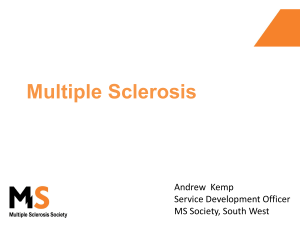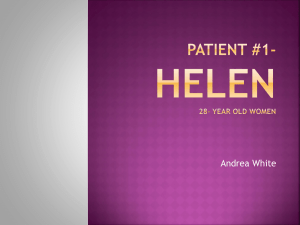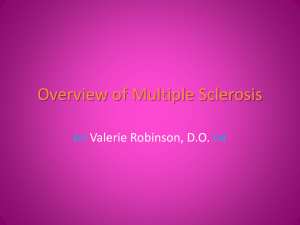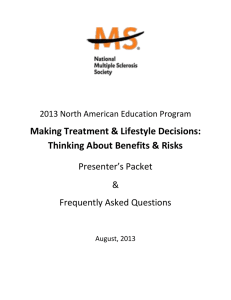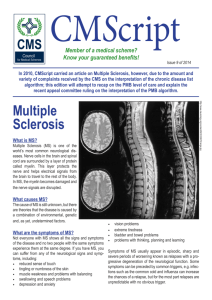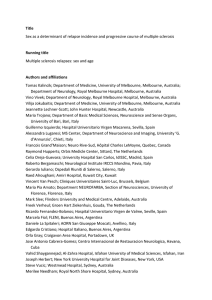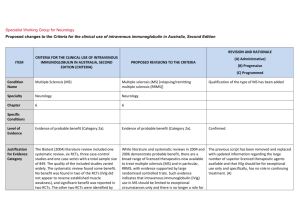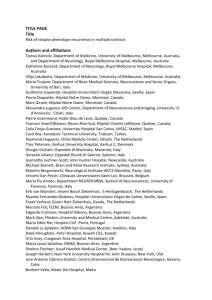MS Fact Sheet
advertisement
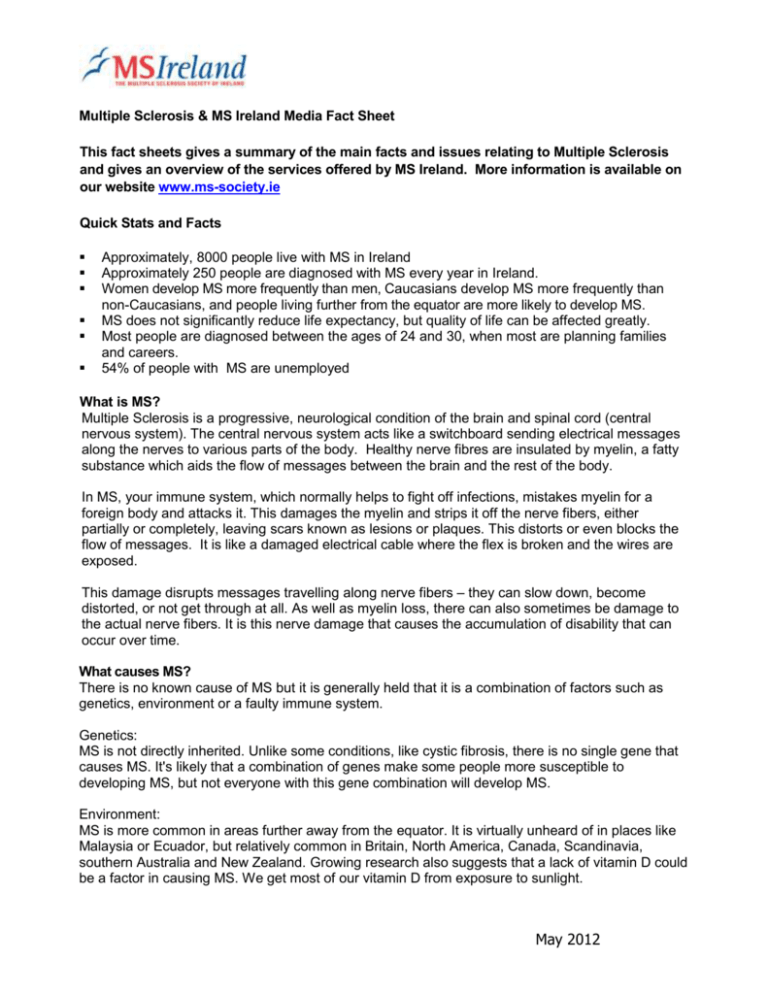
Multiple Sclerosis & MS Ireland Media Fact Sheet This fact sheets gives a summary of the main facts and issues relating to Multiple Sclerosis and gives an overview of the services offered by MS Ireland. More information is available on our website www.ms-society.ie Quick Stats and Facts Approximately, 8000 people live with MS in Ireland Approximately 250 people are diagnosed with MS every year in Ireland. Women develop MS more frequently than men, Caucasians develop MS more frequently than non-Caucasians, and people living further from the equator are more likely to develop MS. MS does not significantly reduce life expectancy, but quality of life can be affected greatly. Most people are diagnosed between the ages of 24 and 30, when most are planning families and careers. 54% of people with MS are unemployed What is MS? Multiple Sclerosis is a progressive, neurological condition of the brain and spinal cord (central nervous system). The central nervous system acts like a switchboard sending electrical messages along the nerves to various parts of the body. Healthy nerve fibres are insulated by myelin, a fatty substance which aids the flow of messages between the brain and the rest of the body. In MS, your immune system, which normally helps to fight off infections, mistakes myelin for a foreign body and attacks it. This damages the myelin and strips it off the nerve fibers, either partially or completely, leaving scars known as lesions or plaques. This distorts or even blocks the flow of messages. It is like a damaged electrical cable where the flex is broken and the wires are exposed. This damage disrupts messages travelling along nerve fibers – they can slow down, become distorted, or not get through at all. As well as myelin loss, there can also sometimes be damage to the actual nerve fibers. It is this nerve damage that causes the accumulation of disability that can occur over time. What causes MS? There is no known cause of MS but it is generally held that it is a combination of factors such as genetics, environment or a faulty immune system. Genetics: MS is not directly inherited. Unlike some conditions, like cystic fibrosis, there is no single gene that causes MS. It's likely that a combination of genes make some people more susceptible to developing MS, but not everyone with this gene combination will develop MS. Environment: MS is more common in areas further away from the equator. It is virtually unheard of in places like Malaysia or Ecuador, but relatively common in Britain, North America, Canada, Scandinavia, southern Australia and New Zealand. Growing research also suggests that a lack of vitamin D could be a factor in causing MS. We get most of our vitamin D from exposure to sunlight. May 2012 Faulty Immune system: Many researchers believe that something like a virus or bacteria triggers the body to mistakenly attack the myelin. What are the symptoms of MS? There is no set pattern to MS and everyone affected by it has a different set of symptoms that vary from time to time and can change in severity and duration. Common symptoms include: Visual problems including blurring of vision/double vision Fatigue which is unpredicted or out of proportion to what you have done Balance Weakness in the limbs Tremors, muscle spasms or stiffness Bladder and bowel problems Altered feelings in arms or legs such as tingling/pins and needles, numbness Speech and swallowing Cognitive difficulties such as loss of concentration, short term memory, problem solving Sexual problems These symptoms are common to many short-term and long terms illnesses and most people who experience them will not have MS. How is MS diagnosed? MS is very difficult to diagnose as there is no one test; neurologists usually have to eliminate other conditions and diseases first. Also symptoms of MS are most often intermittent and appear and disappear over long periods of time. Many people with MS would usually experience seemly unconnected symptoms for months or most often years before a diagnosis is confirmed. A medical history, MRI scans and lumbar punctures are common tests used to gradually diagnosis MS. Types of MS. There are 4 main types of Multiple Sclerosis, each characterized differently: Relapsing – Remitting: This is the most common type of MS. It is characterized by attacks (relapses) and remissions (recovery). During remissions a person would have fewer or no symptoms. Relapses tend to be unpredictable and their causes are unclear. During a relapse new symptoms may occur or previous symptoms may return. A relapse is usually defined as the appearance of new symptoms lasting more than 48 hours. They can last any length of time. In 85 % of people with MS, it starts with a relapsing – remitting phase. Primary Progressive: Some people with MS never have distinct relapses and remissions. From the start they experience steadily worsening symptoms and progressive disability. This may level off at any time, or may continue to get worse. Around 15% of people with MS have the primary progressive form of the disease, which is also known chronic progressive. Secondary Progressive: This type starts in the same way as relapsing – remitting MS but after repeated attacks the remissions stop and the MS moves into what is known as a progressive phase. Around 40% of people develop secondary progressive MS. The time it takes to move into the secondary progressive phase varies. It usually happens within 15 to 20 years of the first onset of MS. May 2012 Benign MS: This type of MS generally starts with mild attacks followed by a recovery. It does not worsen over time and there is rarely permanent disability. The first symptoms are usually sensory. It is only possible to classify people as having benign MS when they have little or no sign of disability 10 to 15 years after the onset of the disease. However, occasionally disability may develop even after many years of the disease remaining inactive. Around 15 - 20 per cent of people with MS have the benign form. Managing MS As there is no cure for MS but much can be done to relieve symptoms, delay progression, maintain mobility and sustain a sense of well-being. Common management techniques include: Medicinal treatments usually fall into 3 categories: Drugs that help to relieve specific symptoms such as pain, spasms etc Drugs that ease relapses – usually steroids Drugs that modify the course of the disease in some way e.g. delay progression or reduce relapses. These disease modifying therapies only work in relapsing-remitting MS. Standard drugs include Copaxone, Rebif, Avonex and Betaferon. Tysabri is also a new treatment in this category. Rehabilitation refers to a group of physical/practical therapies that can help to create independence. Physiotherapy is hugely important to people with MS as it can maintain or improve balance, strength, spasms and fatigue among others. Occupational therapy and speech and language therapy are also key therapies. A healthy lifestyle is essential to ensure you body is at its best to cope with relapses and disability progression. Regular exercise can help people remain mobile and supple. Stress can aggravate symptoms so reducing stress is key. Some diet plans suggest that certain foods and regimes are better for MS. However, a good, balanced and nutritious diet is a good goal. Complementary therapies are popular too as they often help with symptom relief and increase a greater sense of well-being. Multiple Sclerosis Ireland Mission Statement: ‘...to enable and empower those affects by MS to live the life of their choice to their fullest potential…’ MS Ireland is the only national organisation providing information, support and advocacy services for people living with Multiple Sclerosis and their families. The Society provides a wide range of services and programmes designed specifically to meet the needs of the MS community. Individual and Family Support Through our case work service our teams of professional Regional Community Workers support the person with MS through the transitional changes that MS, as a disease, presents. Support is also May 2012 available to the family members in dealing with the challenges they may face as a family unit. Living with MS programmes A range of living with MS programmes, workshops and activities are organised throughout the country that are targeted at various groups such as those newly diagnosed, carers, children of parents with MS and health professionals. Programmes include physical therapies, symptom management and information/education seminars. MS Information Line 1850 233 233 Our confidential information line provides immediate information and support to those affected by MS. The Information Line is open from Monday to Friday 10am– 2pm. Information Our information tools include a variety of booklets and information sheets, our website www.mssociety.ie, our MSnews magazine, conferences, seminars and the valuable knowledge and experience of our staff. The MS Care Centre The MS Care Centre is Ireland’s only respite and therapy centre for people with MS. It offers shorttime respite care, therapeutic services, neurological assessments and many social activities in a homely environment in the suburbs of Dublin. Counselling Trained counsellors are available to people with MS and their families to explore the issues arising from living with MS. Voluntary Branches Our voluntary branches are a support network for people and families living with MS in local communities. They provide a welfare service, access to various therapies and organise various social gatherings. Research Our dedicated research fund annually finances a number of medical and social research projects and we regularly update worldwide research information on our website and publications. Representation MS Ireland advocates on an individual and collective platform for the improvement in services, resources and policies affecting people with MS. For more information about MS or MS Ireland contact: MS Ireland, 80 Northumberland Rd, Dublin 4 Tel: 01 678 1600 Fax: 01 678 1601 MS Information Line: 1850 233 233 www.ms-society.ie For media enquiries please contact Taragh Donohoe, Communications Manager on 01 678 1600/ 087 2565540 / taraghd@ms-society.ie May 2012
